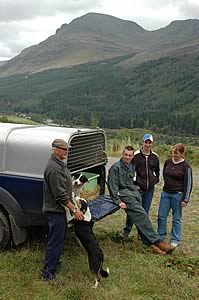 |
|||||||||
|
|||||||||||||||||||
|
|
Fell Farming Trainees Scheme Has Royal Backing A new scheme to encourage young people to work on hill farms in Cumbria has financial backing from a fund set up by the Prince of Wales.
Cumbria Farmer Network, a farmer owned and run not-for-profit company based in Penrith, is running the Fell Farming Trainee scheme. It is looking for eight people, aged 18 and over, who will during a two year period gain hands-on training of all aspects of work on a hill farm. The scheme has been set up after Cumbria Farmer Network was challenged by The Prince’s Countryside Fund to come up with an initiative which would make a significant impact on hill farming in Cumbria. The Countryside Fund was set up this year following the Prince of Wales’s long-held concerns for the future of Britain’s rural areas and helping them become more sustainable. The Farmer Network’s managing director Paul Harper said: “Through the scheme we want to help breathe more young life into the hills of Cumbria. “We want to get young people into agriculture and qualified in what they are doing so that they can work in the hills - either as an employee or self-employed or even take on the tenancy of a hill farm. “We’re trying to get new blood as well as extra pairs of hands onto these hill farms to help maintain the landscape and have benefits for the wider community in the uplands as well as a direct effect on the social fabric of these areas.” The scheme reflects the findings of the report published this year by the Commission for Rural Communities acts as the advocate for England’s rural communities, as an expert adviser to government, and as a watchdog to ensure that government actions, policies and programmes recognise and respond effectively to rural needs, with a particular focus on disadvantage. Among its recommendations in the report - High ground, high potential - a future for England’s upland communities - is securing the future for hill farmers and a new integrated strategy for the uplands. The Prince of Wales, citing the low incomes of hill farmers and the decline of those working in agriculture, says in his promotion of the Fund: “So many of us enjoy walking and visiting the moors, fells and dales of our country. We love them for their breathtaking beauty and for the very special communities that make up the unique rural tapestry. But both are entirely dependent on agriculture – on the farmers who for generations have cared for the land, and for their families who are so often the backbone of the villages and market towns.... “I have heard some people question whether it really matters if farming continues in these areas; that we should just let them revert to how they were before farming began over 3000 years ago. To me, that would be a folly for which future generations would never forgive us.” Paul Harper and his team are well placed to run the scheme. Farmers gave their financial backing to Cumbria Farmer Network in January 2006 to take over the role established by Cumbria’s Rural Futures, a project of Voluntary Action Cumbria, to help them meet change and secure their own futures as well as that of rural Cumbria. A Fell Farming Trainee scheme was run in 2002 by Rural Futures and the Farmer Network ran two successful farm assistants schemes after the company was formed. Trainees who are selected for the scheme will gain experience and be mentored on up to six different farms in a particular valley. Farmers in the target valleys will be trained as trainers and committees for each valley will monitor the scheme’s progress. The trainees will be paid an apprentice rate wage and the host farmers will be paid a mentoring fee during the first year based on how long the trainee works on each farm. “The young people we are trying to attract are those wanting a more practically based method of learning and who do not want the structure and formality of some more class-based courses,” said Mr Harper. However, training elements will include health and safety, ATV use, sheep dipping, shearing, fencing, stone walling, self employment, tractor driving, basic animal care and handling along with agri-environment schemes and educating the public. Trainees must work on hill farms in Cumbria and live in the county and be over 18 on November 1. They must commit to the full training programme and continue to work on hill farms in Cumbria for at least a year after the scheme ends. Potential trainees and farmers interested in becoming trainers should contact Dorothy Wilkinson through the network office on 01768 868615 by October 22. If the scheme is over-subscribed, a selection of candidates will be interviewed.
|
||||||||||||||||||

|
|
||||||||||||||||||
| home | agri-services | pedigree
pen | news | dairy | beef | machinery BPS | property | organisations | site map |
|||||||||||||||||||


